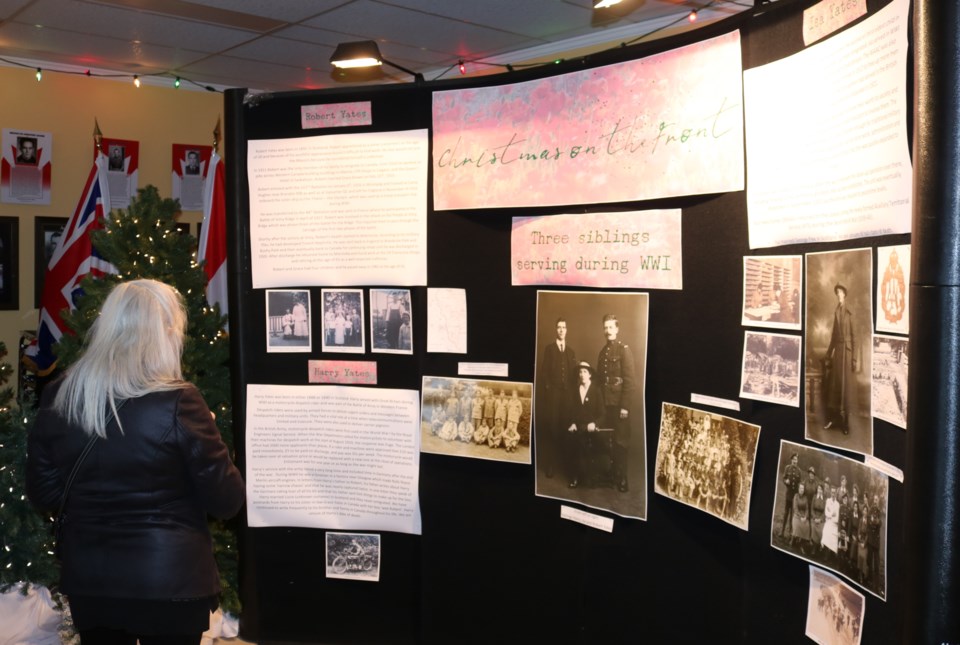YORKTON - It was a special event for the season Saturday as a come go presentation ‘Christmas on the Front’ was held at the Royal Canadian Legion General Alexander Ross Branch No. 77 - Yorkton.
The display was an amazing and rare look back at Christmas during World War One as seen through the eyes of three brothers.
“A friend Kelly Thomas, his family had all of this material,” explained Brittany Johnson, vice president with the Legion.
Kelly Thomas said he actually sort of inherited the material.
“Actually how I got it, an uncle, kind of a family historian, gave it to his daughter,” he said, adding when he one day asked for some more information she said “why don’t I just get it to you. . . I’ve always been kind of interested in family history.”
For the most part the material has been safely away in boxes, but then in conversation with Johnson the idea of the display came out.
“We both came up with the idea,” offered Thomas, who added he was very happy with the result.
“It’s amazing to see it all laid out. It seems so much bigger when you see it all laid out like this.”
Johnson said much of the material connected to Thomas’ great grandfather Robert Yates, who was one of three siblings born in Scotland.
“He was the only member of the family to emigrate to Canada,” she said.
Sister Isa and brother Harry, stayed in Scotland, which mean lots of correspondence back and forth as they stayed in touch, including during the war years with Robert in the Canadian army and a brother Harry with the Brits.
The material included “lots of Christmas cards and New Year’s cards,” said Johnson, adding that was sort of the impetus to create Saturday’s display.
“The whole family was writing back and forth during the war.”
The display covered a number of tables and photos and more material covered room dividers, all of which was almost overwhelming for Shelly Thomas, Robert Yate’s granddaughter. When asked how she felt about the presentation her immediate one-word answer was “tears”.
“It’s amazing. They have done such a great job,” she then added.
While Shelly Thomas knew the family had the material, but being displayed it was like her grandfather was finally speaking to her about the war.
“My grandfather never talked about the war as a lot of people didn’t,” she said, adding the letters are her link to what he dealt with.
“It’s so amazing, the correspondence, they were talking about it (the war) to each other.”
What is perhaps most unique about the material is the brothers father Henry Yates worked at the Edinburgh Scotsman newspaper in Edinburgh and he sent letters set from linotype.
“It looks like it’s a newspaper story,” observed Johnson.
The stories within the correspondence tell much about the trying times of the war years.
For example, Robert left for England with the armed forces with his wife pregnant. He would not see his son until he was nearly two-years old.
“He never met his son until he came back from the war,” said Johnson.
There were even cards that simply said ‘To Daddy’ with love and hugs noted Kelly Foster.
Kelly Foster said he found it compelling when letters turned to life in England during the war, the shortages of some foods, how they wrote of not particularly liking Canadians over there, and of the arrival of the Americans.
Then there were the trenches.
“He (Robert) said five months felt like 10 years,” said Kelly Thomas.
Robert would end up dealing with trench nephritis, also known as war nephritis, is a kidney infection, first recognised by medical officers as a new disease during the early part of the First World War and distinguished from the then-understood acute nephritis by also having bronchitis and frequent relapses.
It put him in hospitals in England and Ontario before getting back to his family in Manitoba, all reflected in letters, although some lines were redacted at the time by officials.
And, “lots of letters talked about the Halifax explosion,” said Johnson, adding that was Dec. 6, 1917.
Interesting the brothers never crossed paths in the war, although they were in the same general area.
Robert would be in the battle of Vimy Ridge, his brother Harry fought at Arras.
“When you go to Vimy Ridge you stay in Arras,” explained Johnson.
The collection started with family in Winnipeg, and Shelley Thomas said they are fortunate that it was all kept, something she added is pretty unique when realizing it’s letters, cards and photographs from more than a century ago.
That most photos have names is amazing too, she said, adding if not documented “there’s no one left to ask.”






